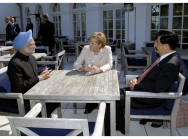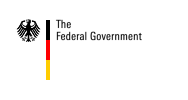This will be the Chancellor's first trip to India. Her four-day trip will take her to New Delhi and Mumbai, where she will also be acting in her capacity as G8 president. Germany holds the presidency until the end of the year, so the Heiligendamm process will play an important part in talks.
Seeking solutions together
 Photo: REGIERUNGonline / Bergmann
Photo: REGIERUNGonline / Bergmann
The aim of the Heiligendamm process is to involve the major emerging economies (India, China, Mexico, Brazil, South Africa) in a structural dialogue with the G8 nations. India and China are already major economic players, which is why they must be involved in global economic issues. Equally, however, their help is wanted to resolve international conflicts.
Answers to the problems of climate change, for instance, can only be found together. "It is quite clear that since the European Union is responsible for 15 percent of total CO2 emissions, we will not be able to resolve the problem unless other countries share the responsibility," said the Chancellor before her trip.
>> The Heiligendamm process
>> We need one another
Opening markets
The Doha Round is another important topic, and the Chancellor will be discussing this in some depth with the Indian Prime Minister Manmohan Singh. The Doha Round aims to reach agreement on the liberalisation of world trade by the end of the year.
The main bone of contention is state export subsidies for agricultural produce from Europe and the USA. Developing countries complain that their produce does not have a chance on the world market against these subsidised competitors. The industrial countries in return complain about the high customs duties imposed on their industrial products.
As she prepared to travel, Merkel was cautiously optimistic. "We still have a chance of success before the end of this year," she stated.
>> The Doha Round
Two Priority Areas: Business and Science
The Chancellor will be accompanied by a large business delegation. She hopes to establish "interesting new contacts for industry" on her trip, as she stated in her video podcast on Saturday.
Scientific cooperation too, however, will play a major part. Oneconcrete topic will be climate change. Germany is export leader in the field of environmental technology. Cooperation is thus planned in fields such as solar thermal power and photovoltiacs, but also in plant breeding. A German-Indian science centre is to be founded.
The Science Express rolls through India
Federal Research Minister Annette Schavan and a scientific delegation will also be accompanying the Chancellor. The German scientific community will be presenting itself as an express train, the Science Express, which will be rolling through India.
This Science Express will visit 56 Indian towns and display high tech solutions in 13 carriages. The Chancellor is convinced that this is the right approach. "We do not only aim to cooperate in small, specially selected areas. We are ready to develop joint research capacities."
Also on the agenda: Minority rights
To allow her to gain a comprehensive impression of the country, the Chancellor will be meeting Indian intellectuals. She will discuss the protection of minorities and minority rights with representatives of Indian civil society.
The discussions will focus on the major problem of marginal groups in India. The question of how these groups can benefit from the economic growth of the country is an important issue for Indian society.
The major task: Living with extremes and building bridges
India has developed at a meteoric rate. On the one hand, the country is a competent competitor in many product areas, including the Internet, high-tech products and software programming.
The other side of the coin is, however, that about one quarter of India's population of more than one billion live below the poverty line, surviving on less than one US dollar a day. 600 million people live in rural areas, some in positively mediaeval conditions. India is thus one of the main partners of German development policy. "One of the major tasks will be living with these extremes and bridging the gap in a sensible way," stated Merkel before her trip.
Not only politically, but also economically, India is a shooting star, which already has a significant influence on the global economy.Trade between Germany and India has expanded very dynamically in recent years. German exports to India rose by 50 percent last year, while imports from India increased by 20 percent. This translates as a trade surplus of more than two billion euros for Germany.German exports are accounted for mainly by machinery and plant and electronic equipment. Thirty percent of Indian exports to Germany are still textiles. Increasingly, however, India is also exporting high-quality capital goods such as machinery and plant and chemical products.This rapid growth in trade reflects India's fantastically dynamic economy, which grew by 9.4% last year. This year, the growth rate is again expected to top nine percent. The per capita value added has more than doubled since 2002. Although it is still comparatively low at 965 dollars, it is rising rapidly.It is no longer agriculture and simple manufactured goods which are the locomotive of growth. India's services sector now generates 55% of the country's national product. India is rapidly becoming a high-tech economy, specialising in services.
